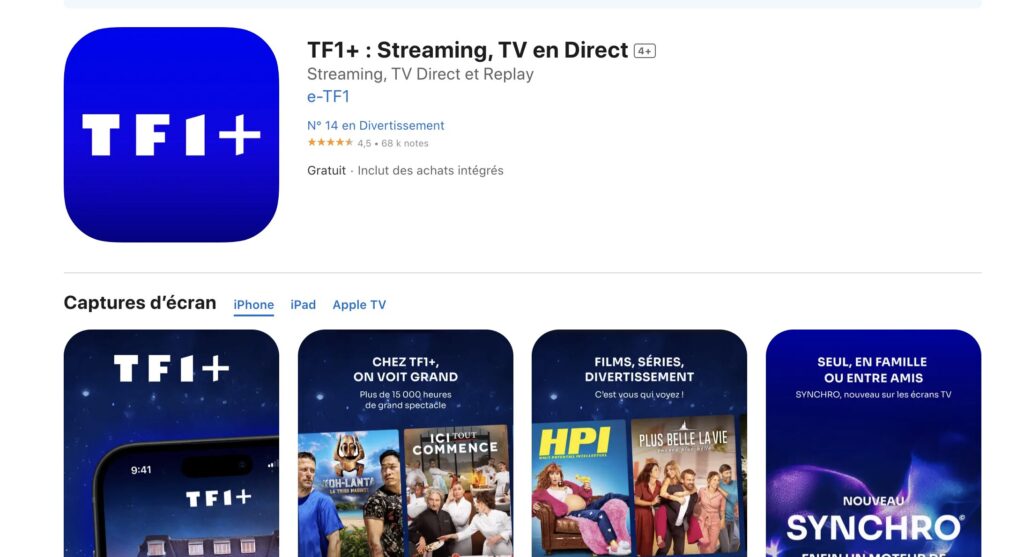According to the European Commission, geoblocking operated by Apple to identify users from a country is not legal. Europe would like a French person to be able to download the same applications as a Spaniard without having to change accounts.
In a press release published on November 12the European Commission announces that it is attacking Apple on an unexpected subject: the geoblocking of its services, which allows the brand to offer applications exclusive to France in France, and exclusive to Spain in Spain.
According to Europe, this practice, although widespread throughout the digital industry (the Google Play Store, PlayStation Store, Spotify or Netflix offer different content depending on the country), is illegal. Apple must stop “ discriminate illegally » Europeans to comply.
What does Europe have against Apple this time?
The European Commission, which targeted Apple with the Digital Markets Act, continues to attack the closed model of the Californian company. Here she attacks the Apple Media Services division, which brings together the App Store, Apple Arcade, Apple Music, Apple Books, Apple Podcasts and the iTunes Store, within the framework of “Geo-blocking regulation”.
Today, when you identify yourself with a French account, you have French versions of Apple applications. The App Store highlights French applications (like those from TF1 or Canal+), Apple Music highlights French artists while Apple Podcasts prefers French-speaking content. Applications unavailable in France, such as Spanish television replay services, are not available on the French App Store. To access them, you must log out, create a Spanish account and download them. It is the developers who decide where their applications can be downloaded, sometimes by offering different software in each country (Paramount+ is not the same in France and the US, in particular).
To access certain applications unavailable in France, you must change your App Store account today. // Source: Numerama
According to the European Commission, the local operation of Apple accounts is illegal, since it discriminates against users in the European Union. Europe deplores:
- that member countries of the European Union do not have access to the same version of the App Store and Apple services.
- that it is complicated to change the nationality of your account (it is actually easy, unless a subscription is in progress).
- that it is compulsory to pay with a French bank card on the French App Store and with a Spanish card on the Spanish App Store.
- that it is not possible to easily download an application exclusive to Spain from France, since you have to change accounts.
Clearly, Europe requires the merger of all European regions, so that Apple no longer offers a single “EU” region, which would provide access to content available in the 27 member countries. It would technically still be possible to have a homepage tailored to each country, but the basis of the account would have to be the same.
What will happen to the App Store in Europe?
Apple has one month to respond to the European Commission’s request by proposing an action plan. If its plan is not suitable for Europe, then the competent authorities could open a case against the company. Apple would be in non-compliance with the “Geo-blocking regulation”, which forces companies not to treat member countries of the European Union differently.
In its press release, the European Commission indicates that Google was attacked for the same reason in 2023. The company would now encourage developers to publish their applications throughout the European Union, without discrimination on payment methods. A path that Apple could follow. Other services, such as video game stores, are not currently targeted by the European Union. Yet they do the same thing.
 Today, the TF1+ application is reserved for France. Europe would like to be able to download it in Norway. // Source: Capture Numerama
Today, the TF1+ application is reserved for France. Europe would like to be able to download it in Norway. // Source: Capture Numerama
The European Union does not mention Apple Intelligence
Strangely, the press release from the European Union, which still accuses Apple of “discrimination” even though it is above all a way for the brand to manage different stores in each country, does not mention Apple Intelligence. The service, which is blocked from the EU, nevertheless uses Apple accounts to identify a European and deprive them of the service. His example of discrimination would have been much more relevant here, but Europe doesn’t seem to make the connection.
In the future, it is likely that Apple will make the operation of the App Store in Europe even more flexible. Logic would dictate that the 27 member countries have the same catalog, with only local variations in the presentation.

